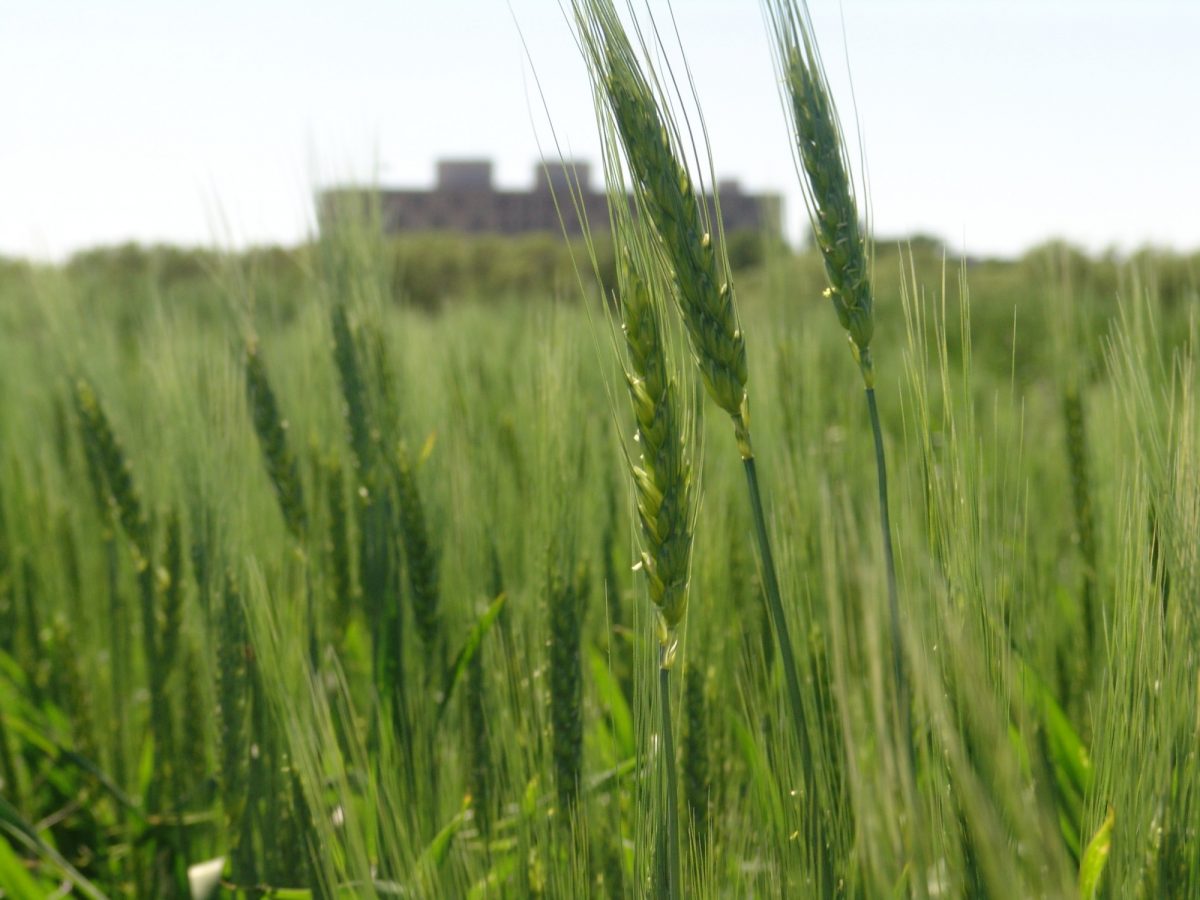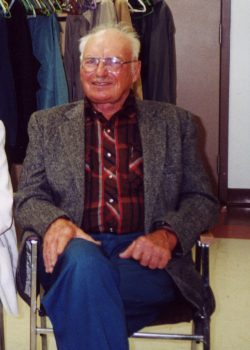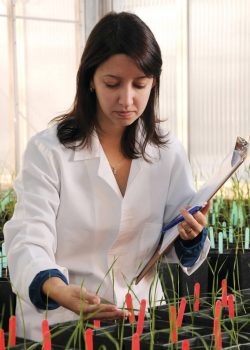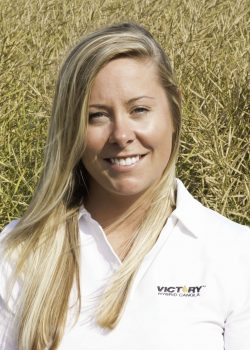
A love for farming, a gift for research
Grain farmer’s donation supports young wheat researchers and helps deliver innovation to farmers
The foresight of a southern Manitoba farmer has helped launch plant scientists to research Canadian Western Red Spring wheat to make a difference in Canadian agriculture.

Willy Wiebe
The Willy Wiebe Graduate Fellowship program at the University of Manitoba was created in 2005 by a generous gift from the estate of the late Willy Wiebe, a farmer from the R.M. of Montcalm. Through his bequest, an endowment fund was set up in the Faculty of Agricultural and Food Sciences to support a graduate fellowship in wheat breeding and research.
Willy’s remaining younger brother explained some of the character of the man behind the award.
“Willy appreciated and cherished his land. The drudgery and monotony of farm work did not intimidate him. He never complained. He expanded the remaining 57 hectares of his parents’ 130-hectare farm to nearly 500 hectares.”
“The fundamental quality of Willy’s person was that he gave as good as he got, and in his love for and commitment to farming and the way of life that goes with it. He gave to farming what he got from farming.”
Born in 1929, Willy grew up on the family farm four miles east of Rosenfeld, MB. He carried on the mixed farming operation (grain, feed grain, forage crops, milk, cows, egg, hogs and poultry) from his parents, expanding grain production, his main interest. Wiebe passed away in 2001. His last year at Amsterdam School District, a country school in the R.M. of Rhineland, saw him complete Grade 7, yet by way of his inherent ingenuity and hard work to build up his farm, his estate provided a $450,000 gift to be used for breeding and research in Canadian Western Red Spring wheat.
Interest from the endowment fund provides an annual fellowship, which can be renewed by the same recipient in a Master’s or Ph.D. program. Applicants must be enrolled in a graduate studies program in Agricultural and Food Sciences at the University of Manitoba, meet the fellowship’s academic criteria, and have identified a project in breeding and research in Canadian Western Red Spring wheat.
Dr. Anita Brûlé-Babel, Plant Science professor and senior wheat breeder at the University of Manitoba, emphasized the value of this award to the agriculture industry.
“The Willy Wiebe Graduate Fellowship program supports one of our most important resources, the education and training of the next generation of agricultural specialists that provide leadership and innovation for the future. The Fellowship has supported research that addresses immediate issues for wheat farmers.”
“For example, the Fellowship’s first recipient Golam Rasul worked on the identification of genes that improve pre-harvest sprouting resistance, and students Silvia Rosa and Marley Boyce engaged in the characterization of new leaf rust resistance genes. Amy Mangin studied the management of plant growth regulators and nitrogen in high yield spring wheat, and Yang Lin pursued the development of marker assisted selection methods for Fusarium Head Blight resistance. The fellowship has been highly successful and provides the opportunity to conduct in-depth, applied research that has a direct benefit to wheat producers around the world,” said Anita.

Silvia Barcellos Rosa
One of the earliest recipients of the Fellowship was Silvia Barcellos Rosa, who moved to Canada from Brazil in 2008 with her family to pursue her doctorate in plant science under the supervision of Dr. Brûlé-Babel and Dr. Brent McCallum (Agriculture and Agri-Food Canada- AAFC). The daughter of a wheat breeder and a wheat pathologist, Silvia was already deeply interested in plant genetics. Her PhD project sought to identify, characterize and map new sources of leaf rust resistance in wheat.
“The Willy Wiebe Fellowship had a positive impact in my professional and personal life. It opened many doors. It allowed me to work with some of the best researchers in wheat breeding, genetics and pathology,” said Silvia.
Her PhD study resulted in the publishing of three scientific papers, and has led to three additional studies in Manitoba, Quebec and the United Kingdom, including the possibility of cloning some of the genes identified in Silvia’s project.
“The fellowship is affecting outcomes in wheat research and production. I enjoy the fact that my work could help, even in a small way, farmers to feed the world,” she said.
Following graduation in 2013, Silvia returned to Brazil to work in the family wheat breeding company. She returned to Canada for postdoctoral studies and today works as a senior spring wheat breeder at the Centre de recherche sur les grains (CÉROM) in Quebec. Here, they have registered two spring wheat cultivars and are developing multiple national and international studies to improve wheat.
“It was an honour to be awarded the Willy Wiebe Fellowship. It enabled my family to move to Canada, giving the opportunity for a better life and education for my children,” Silvia added.

Marley Boyce
Originally from Thunder Bay, Marley Boyce came to the University of Manitoba to pursue her undergraduate education. She said she quickly discovered a passion for agriculture and switched her degree focus to a Bachelor of Science in Agriculture in plant biotechnology. She then began a Master’s program in plant breeding and genetics under Dr. Brûlé-Babel and Dr. Colin Hiebert (AAFC).
“Without the support of the Willy Wiebe Fellowship, I would not have been able to have the focus and time needed to complete my research project and thesis writing, class work, volunteering and also dedicating part of my time as a teacher’s assistant,” said Marley.
Marley had worked with Cargill in seasonal R&D roles during her undergrad, and after graduation in 2014, she was hired by the company as an associate canola breeder. Today, she is the North American Breeding Manager for their speciality canola programs focused on healthy and sustainable oil genetics.
“What I enjoy most about my career today is the diversity of what I can do in a day, week or even a year. Leading people and projects allows me to expand my knowledge in areas outside of research and development, and understand the bigger picture. I learn every day and that is exciting to me,” she said.
“I truly feel this award helped me get to where I am today and for that I will always be grateful,” said Marley.

Pratisara Bajracharya
Pratisara Bajracharya, another recipient of the Willy Wiebe Fellowship, points to the award’s inclusivity as enabling her education as, at the time, it was one of a few fellowships open to international students. She had undergraduate degrees from Nepal and North Dakota before beginning her academic journey at the University of Manitoba in 2012 as a Masters student in plant pathology and genetics under the supervision of Dr. Curt McCartney (AAFC) and Dr. Fouad Daayf in the Department of Plant Science.
“Receiving the Willy Wiebe Fellowship was a validation of the hard work I was putting into my degree and it also meant I had one less thing to worry about, allowing me to just focus on my grades and learning,” said Pratisara.
After graduation in 2015, she joined the provincial government as a Field Crop Pathologist, an opportunity she jumped at because she believed it was her chance to give back to the growers in Manitoba while learning from some of the best people in the industry. Today she is a Pesticide-Minor Use and Regulatory Specialist for Manitoba Agriculture and Resource Development and works closely with growers and grower associations to identify and register potential pest management products in small acreage crops in Manitoba.
“I enjoy the everyday interactions with growers, and that I have the opportunity to help the people who work hard to put food on our table. I also love being able to go all over Manitoba and interact with growers from different parts of Manitoba and see different kinds of agriculture throughout the province,” said Pratisara.
If she could say one thing to the man who sponsored this award?
“I would like to say ‘Thank you’ for your generosity and your support,” she said.
The Willy Wiebe Graduate Fellowship continues to provide important support to student researchers who are interested in wheat breeding and research. Interested students are invited to contact the Faculty of Agricultural and Food Sciences at agfoodsci@umanitoba.ca.






